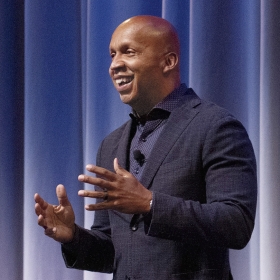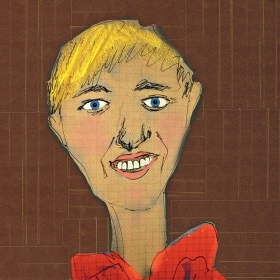Lawyer and criminal justice activist Bryan Stevenson addressed the Wellesley community on April 28 at the combined Betsy Wood Knapp ’64 Lecture in the Social Sciences and Wilson Lecture. Stevenson, founder and executive director of the Equal Justice Initiative, spoke about the soaring number of Americans affected by mass incarceration.

Lawyer and criminal justice activist Bryan Stevenson addressed the Wellesley community on April 28 at the combined Betsy Wood Knapp ’64 Lecture in the Social Sciences and Wilson Lecture. Stevenson, author of Just Mercy, is the founder and executive director of the Equal Justice Initiative, a human rights organization in Montgomery, Ala., that has won major legal challenges eliminating excessive and unfair sentencing and exonerating innocent death row prisoners.
Stevenson spoke about the soaring number of Americans affected by mass incarceration. “We had a prison population in America that was largely stable throughout the 20th century,” he said. Beginning in the 1970s, the rate skyrocketed. “We went from 300,000 people in jails and prisons to 2.3 million people,” he said. “We’ve become the most carceral, punitive society on the planet.”
But Stevenson quickly turned to action. “I do believe there are things we can do individually, and things we can do collectively, that will have an impact on the justice deficit,” he said. “I do believe we can increase justice.”
Stevenson said it’s important to stay hopeful: “Hopelessness is the enemy of justice,” he said.He traced his own hopefulness back through his family, to his great-grandfather, an enslaved man who taught himself to read as a child in Virginia in the 1850s, in the face of harsh anti-literacy laws. “I don’t think I would be standing here if my great-grandfather hadn’t created that reality for us,” he said. “You can make decisions that are hopeful about what you are going to do, where you are going to go, how you are going to serve, what you are doing to make a difference.”


